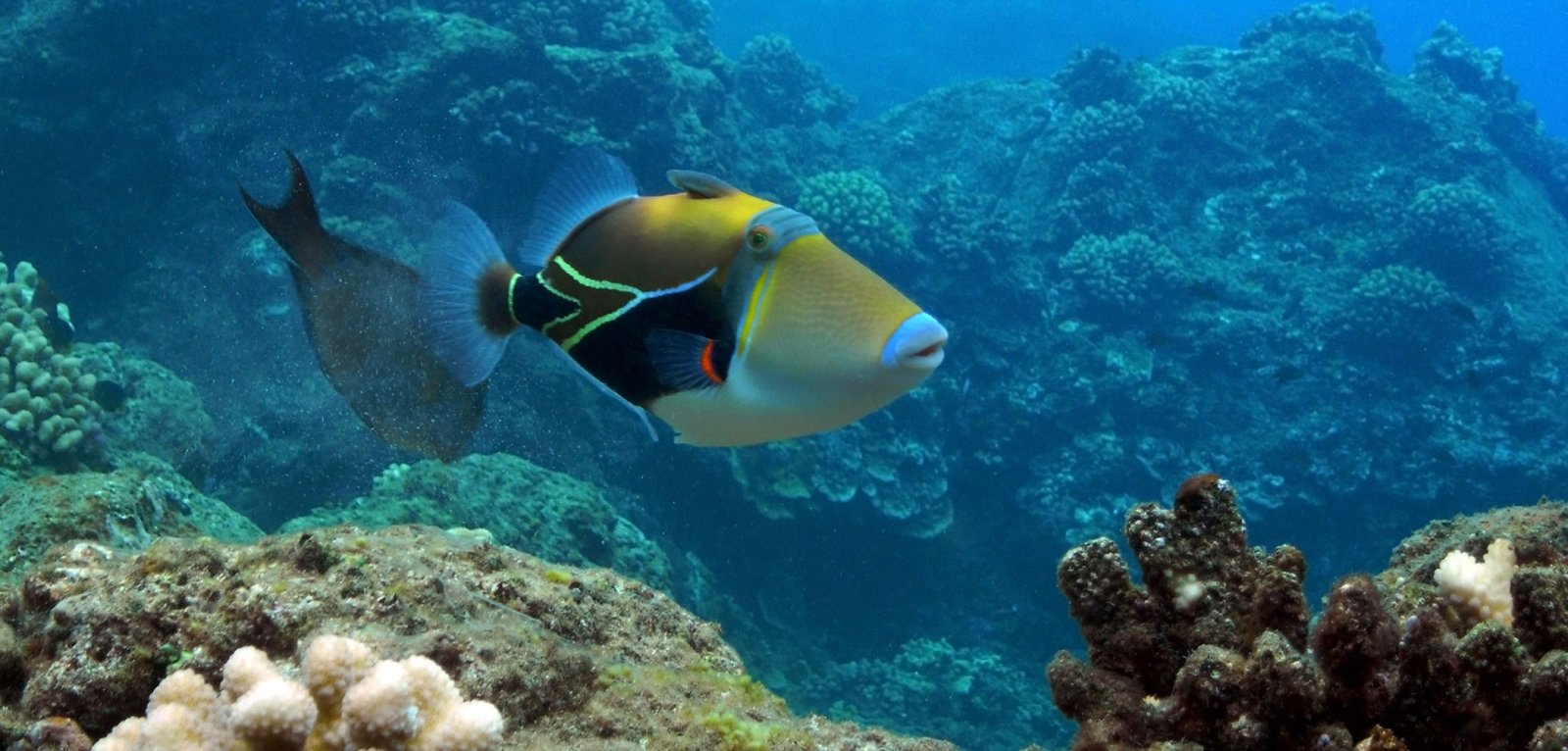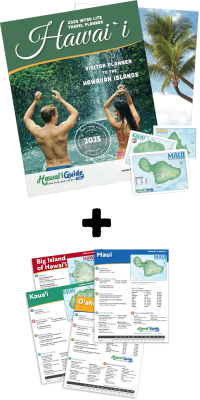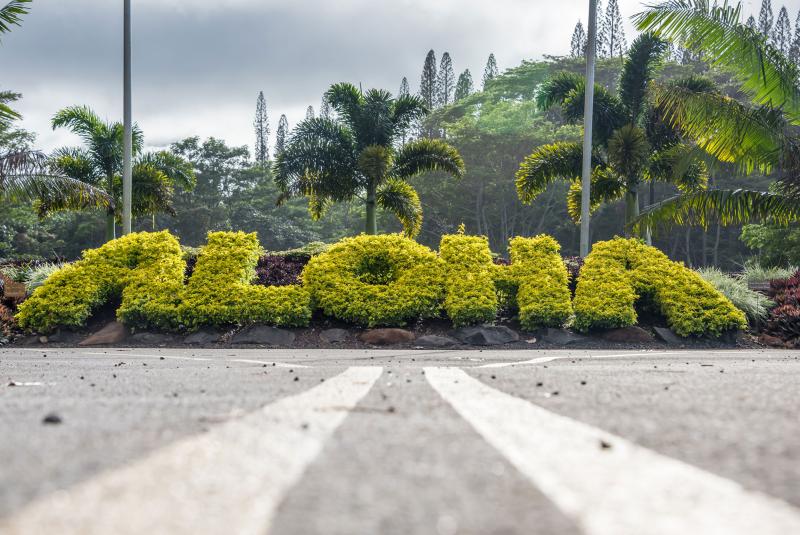03-09-2025
Aloha'Olelo Hawai'i
Hawaiian Words to Know for Your Vacation
This article may contain affiliate links. We earn a small commission at no extra cost to you. Mahalo!
We've found some common Hawaiian words to know for your vacation. Hawaii is the only U.S. state with two official languages, Hawaiian and English. Although Hawaiian was once widely used in conversation today, seeing and hearing just a tiny percentage of the language is common. Locals interject words and phrases in conversation and songs, and street and place names often appear in Hawaiian. You may also hear a pidgin form of Hawaiian, which combines elements of both vocabularies.
Interesting Fact About the Alphabet
An interesting fact about the Hawaiian language is that it only has 12 traditional letters: A, E, I, O, U, H, K, L, M, N, P, and W. This makes it one of the shortest alphabets in the world.

Friends enjoying a view
Now, on to Vowel Pronunciation:
A - pronounced ah, as in father; E - pronounced ey, as in they; I - pronounced ee, as in peep; O - pronounced o, as in own; U – pronounced oo, as in moon
And the Consonants:
H, L, M, and N are all pronounced just as they are in English. K and P are also pronounced the same but with less aspiration. However, the W can vary a bit. W after i and e is pronounced like a very soft V. After u and o, it’s pronounced like W. Any word that begins with W can be pronounced as W or a very soft V.
You’ll also want to know about the 'okina- it’s a glottal stop, or a small break in a word, and is considered a consonant. Think of ‘oh-oh’ in English; that quick pause between ‘ohs’ is like the 'okina. Hawaiian also uses the kahakō, or macron, which emphasizes long vowels. While we respect these symbols as an integral part of the language, we will not be using them here for simplicity.
Some Hawaiian Language Tips to Remember:
- Hawaiian words will never end with a consonant, always a vowel.
- Every syllable must end with a vowel.
- Every consonant must be followed by at least one vowel.
- Syllables are only one or two letters long, never longer.
Now that you have the basics down let’s learn some of the words and phrases you might encounter during your trip.
Common Words and Phrases:
Aloha - Hello, goodbye; also love, affection. You will usually hear it used as a greeting
Aloha kakahiaka – Good morning
Aloha auinala – Good afternoon
Aloha ahiahi – Good evening
Aloha nui loa – Very much love
Pehea oe – How are you?
Maikai no au – I am fine
Aole pilikia – No problem, you’re welcome
E komo mai – Welcome (greeting)
A hui hou – Goodbye, until we meet again
Mahalo - Thank you
Mahalo nui loa- Thank you very much
Kokua - Mutual assistance, pitching in. You may hear 'Mahalo for your kokua.'
Ohana - Family
Keiki – Child(ren)
Malihini - Newcomer, visitor, or one of unfamiliar or foreign origin
Hale – House, home
Akamai – Smart, intelligent, clever
Wahine - Woman, female
Kane - Man, male
Pau - Done, finished
Hana - Work
Pau hana - End of the work day. (You may see pau hana restaurant and bar specials or what the mainland U.S. knows as happy hour.)
Okole Maluna – Bottoms up! (A toast)
Pupu – Snacks, appetizers
Ono – Delicious (also a type of fish)
Luau - a Hawaiian feast
Hula – Traditional Hawaiian dance
Imu – Underground oven, typically used at a luau
Poi - Hawaiian dish made from crushed taro root
Hulihuli – Rotisserie or end-over-end, as in the style of cooking chicken
Lei - A necklace, usually of flowers, but is also made of shells or kukui nuts
Kukui – Candlenut tree, the state tree of Hawaii. The nuts have a high oil content and were once used as candles.
Puka — Puka shells are round with center holes, strung together to make necklaces. These rare shells are often substituted with beads for jewelry making.
Honu - Hawaiian green sea turtle
Lanai - Balcony, roofed patio, veranda
Koa – Warrior. Also, a native tree used to make canoes and other special wooden objects
Holoholo – To travel for adventure and enjoyment. It can also refer to going fishing.
Kapu – Keep out, forbidden. (Please respect these signs when hiking and exploring.)
Makai - Towards the ocean, on the ocean side
Mauka - Towards the mountain, on the mountainside
Moana - Ocean
Pali - Hill
Ala – Path, trail, road
Aina – Land, homeland
Kai – The sea, saltwater
Wai – Freshwater
Pahoehoe – Type of smooth-surface volcanic rock
Malama - To take care of, to tend. Malama aina- To care for the land.
Kamaaina - One of the land native-born Hawaiians. Also used when referring to long-term residents of the Islands
Hana hou – Do it again, one more, encore. An appreciative response after an event.
Menehune – Mythical and sometimes mischievous small people who are said to be very smart and are known to pierce the hearts of angry people to fill them with love. They are said to magically build large structures overnight.
Wiki - Quick, speedy. The Wiki Wiki is a shuttle system at the Honolulu Airport.
Pono - Right or righteous. Malama pono- Take care, be right (as a parting expression)
Kuleana – One’s personal sense of responsibility, accountability
Alii - Chief, royalty
Kahuna – Expert. Usually refers to a priest, minister, or person held in esteem
Kuuipo - Sweetheart. Often used on jewelry - especially the Hawaiian bracelets worn by wahine
Paniolo - Hawaiian cowboy
Mana – Spiritual or magical power
Nani – Beautiful, pretty
And we’ll close with one of our favorites (now that you’ve practiced):
Humuhumunukunukuapuaa - Topical reef triggerfish; also the state fish of Hawaii
Grab Your Free 2025 Guides!
Hawaii Intro Visitor Guide
+ Our Summary Guidesheets!
Includes the top must-see & do attractions, best times to visit, a monthly weather & visitor summary, and our tips on how to save when booking your car rental, tours, and activities. Plus, grab our free Hawaii Summary Guidesheets. Check out our 2025 Hawaii Visitor Guides.

Humuhumunukunukuapua'a (Trigger Fish)
It’s worth noting that a Hawaiian language renaissance is underway as more people are interested in learning this once-repressed form of communication.
We hope this list of Hawaiian words gets you off on the right foot, whether you’ll be using them exclusively on your Hawaii vacation or looking to delve deeper into this beautiful Polynesian dialect.
Interested in learning more about Hawaii and its history? Please read our blog, which covers all about the beautiful Hawaiian Islands!

Published by: John C. Derrick
Founder & certified Hawaii travel expert with 20+ years of experience in Hawaii tourism.
2025 Hawaii
Visitor Guides!
Visiting Hawaii soon?
View Free Guide
~ Detailed maps, insider tips, hotel recommendations, tour & activity suggestions, local dining, and more! ~
Affiliate Disclosure: We may earn commissions from some travel partners (like Amazon or Expedia) which helps us maintain this site. These links are at no extra cost to you and don't impact our honest & unbiased recommendations. Remove all the ads →



